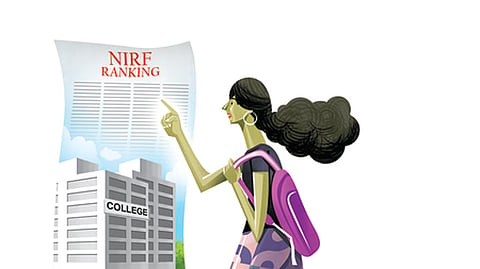

NEW DELHI: A collective call was given by multiple universities across the country on the need to bring in dynamic reforms in the Education Ministry’s National Institutional Ranking Framework (NIRF) that is released annually.
The criteria used for ranking remains the same since its inception a decade ago and hence the demand for changes in it, said multiple people who took part.
A meet was held at the IISc Habitat in Delhi on Friday evening in connection with the reforms required in these National Rankings.
They are decided by the National Board of Accreditation, constituted by the Ministry.
Education Secretary Vineet Joshi chaired the meet in which Chairman of the Executive Council of the National Assessement and Acrcediation Council Anil Sahasrabudhi and representatives of the IITs of Roorkee, Mumbai, Madras, Delhi and Bhubaneshwar took part along with those from many National Institute of Technologies and universities from across the country including from Kerala, Tamil Nadu and Jammu & Kashmir.
There was a controversy over the National Rankings 2025 due to the ups and downs of some universities.
This forced NBA to go in for a third party vetting for the first time by the firm Ernst and Young before they were made public after much delay in September 2025.
A senior educationist told this reporter, on the condition of anonymity, that a key recommendation was the emphasis given to the `Perception’ factor.
“Perception is a relative term. By giving ten marks out of 100 in the rankings to this aspect, it was not a fair assessment was the opinion expressed by multiple heads of institutions. Though the ranking committee said they spoke to peers, professors and the general public before assessing the perception factor, representatives of universities expressed their unhappiness over it and recommended that this criterion be dropped,” he said.
Another recommendation was that the 20 marks given to the Graduation Outcome (GO) takes into account the number of graduates who get employed after passing out.
“There are hundreds of students who take over their family business or run their own start-ups. This is not given any weightage. Hence, there should be value attached to these aspects too and not just for those who go into traditional forms of employment,” he added.
Many educationists also pointed out that institutes not recognised by the National Medical Commision, the Dental Council of India, the Bar Council of India or the All India Council of Technical Education find place in the rankings.
“Such educational institutions need to be dropped,” they felt. The Head of an institute also pointed out that technical universities in the country, numbering around 20 are left out of the rankings. “They need to be included. Such a competiton will help them improve their professional standings and make them competitive,” he said.
The story is reported by S. Lalitha for The New Indian Express
